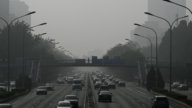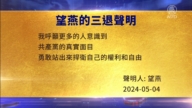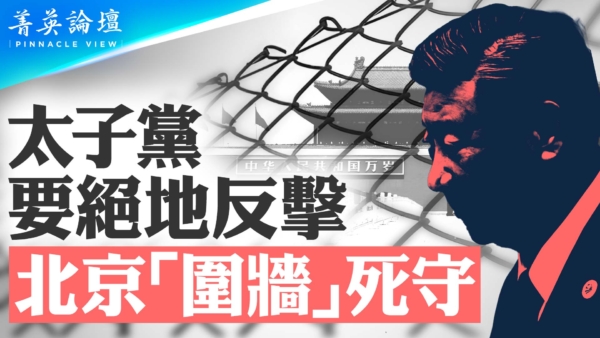【新唐人2012年6月11日讯】5月31号,三百多名“非北京籍学生”的家长,第24次来到教育部信访办,为孩子不能参加北京高考而申诉。两年来,他们每个月都来到这里。教育部部长袁贵仁在今年“两会”上表态,年内会公布“随迁子女异地高考”方案。但直到高考前夕,家长们依然没有盼来任何消息。
10万多人签名,2000多名志愿者,连续3年坚持不懈到教育部门表达诉求……这是一个为了孩子能接受公平教育,而聚集到一起并不断壮大的群体。
据第六次人口普查数据,中国目前有2700万“随迁子女”,但按照高考“户籍”、“学籍”双认证规定,他们必须回原籍报名参加高考,哪怕在就读地已经取得学籍多年。
“北京师范大学中国劳工问题研究中心”副研究员张网成指出,虽然中国表面上看起来更开放,但是实际上社会分层越来越复杂,高考制度的不公平也越来越严重。
张网成:“但是具体去改变某些东西,相对来说比较困难,而且可能会越来越困难。 记者(为什么﹖)因为既得利益集团已经形成了。比如像北京,他不可能完全打开这东西。一旦形成隔阂以后,你要再打破就涉及到阶层利益的问题。现在有集团利益,有阶层利益,有区域利益,中国的利益分配相对来说比较复杂。”
孩子的前途牵动着家长的心。家长们每个月到教育部信访办聚集。没人接见、没人收材料,他们把三年多来的争权经历做成海报展出,家长轮番上台演讲,讲述自己孩子的遭遇,家长们极力避免成为维稳力量打击的对像,竭力以温和理性的面貌企盼当局沟通。
在家长的努力下,近两年,有数十名北京市人大代表联名提交“合理解决非北京户籍居民的子女参加北京地区中考和高考”的提案。教育部部长也不得不连续两年做出相应表态,说,“很快将出方案,目前正在加强调研”。
温家宝总理在2011年也曾提出,“抓紧研究制订随迁子女接受义务教育后,在输入地参加升学考试的办法。” 但至今教育部门仍未出台任何政策。
北京注册会计师杜延林说,一些学者和官员,他们往往以事情复杂的理由搪塞,其实就是立场问题,就是不想放弃既得利益集团本身的利益问题。
杜延林:“最根本的不是难易的问题,而是想不想做的问题。有一部分人不想失去他的利益。普通的北京人,普通的上海人其实是跟着这些既得利益集团,这些控制资源的高官在享受一些福利。但是本质的是高官不想放弃他们这些特权。”
杜延林说,根本的症结还是没有一个公平的法治环境,没有一个公平的民主机制。因为在一个正常的国家,在一个民主国家,所有问题都会提交到议会进行表决,乃至全民公决。
杜延林:“但是在我们这样一个国家,任何问题都是由当权者自己说了算。而他又是站在他自己立场上看问题。所以在这样一个环境下,你所有的不公平都很难指望他们开恩去给你解决。”
官员们坦承,牵扯利益太复杂,这是一块难以撬动的奶酪。教育部副部长杜玉波在今年“两会”表示,“解决异地高考的问题,既要解决随迁子女的考试问题,又不能影响北京、上海当地考生的权益”。教育部原副部长吴启迪也曾说,异地高考牵涉的利益很复杂,这不是教育部一家就能解决的问题。
采访编辑/秦雪 后制/萧宇
Non-Beijing Residents Can’t take college entrance exams in Beijing
On May 31, more than 300 students parents, who are
not resident in Beijing, came to the Petition Office of the Ministry of Education.
They were appealing against their children not being
allowed to participate in Beijing college entrance exams.
They have appealed there every
month during the past 2 years.
Yuan Guiren, section head of the Ministry of Education
claimed that plans for students taking entrance exams
in other provinces would be released at this year’s National
People’s Congress and Political Consultative Conference.
The parents however have not heard any good news
before their children’s exam.
Over 100,000 people have signed the petition,
and over 2000 volunteers have appealed
to the Ministry of Education over the last 3 years.
There is a growing group asking
for fair education for their children.
According to Sixth Population Census data, 27 million
students have moved to other places with their parents.
Based on the college entrance exam policy, they have
to go back to their city of birth to participate in the exams.
This is even if they have previously graduated.
Zhang Gangcheng, research associate at China Labor
Research Center in Beijing Normal University commented.
Although China seems open on the surface,
its social hierarchy is actually increasingly complex.
College entrance exams have become increasingly unfair.
Zhang Gangcheng: “It’s hard to change something,
and is can be more and more difficult.
This is because the vested interest group is already formed.
Take Beijing, it can’t be broken through.
Once there is conflict, you will touch the issue of class
interest if you break through the conflict.
Right now there is group interest,
class interest, and area interest.
The distribution of interest in China is very complex.”
Parents care about their children’s future.
They gather at the Petition Office
of the Ministry of Education every month.
No officer, however, would see them or take their materials.
They made a poster about their experiences
pursuing their rights over 3 years.
The parents take turns to give speeches on stage,
telling people their children’s unfair experiences.
Parents are trying their best not to be the target
of suppression by the government.
They use mild and rational ways to
ask for communication with the authorities.
As a result of these parent’s efforts, more than 10 Beijing
People’s Congress representatives submitted a proposal.
This is to ‘appropriately solve the issue of students of
non-Beijing residents taking college entrance exams in Beijing’.
Prime Minister Wen Jiabao also spoke of this issue in 2011.
“We should hurry to find a method to solve the issue
of students taking the exam in other provinces.”
To date, there has been no policy made.
Du Yanlin, a Beijing certified public accountant commented.
Some scholars and officials usually take the complexity
of an issue to be an excuse.
Actually it’s the issue of their standpoint.
The issue is if they want to give up their interests or not.
Du Yanlin: “The root issue is not how difficult it is,
but if they want to deal with it or not.
Some people don’t want to lose their interest.
Normal Beijing people and normal Shanghai people
are actually following the vested interest group,
and officials who control resources and benefits.
The root is that those high level officials
don’t want to lose their privileges.”
Du Yanlin says the root problem is that there is not a fair
legal environment, nor a fair democratic mechanism.
In a normal state, a democratic state, all issues should
be submitted to parliament, and even society, to judge.
Du Yanlin: “But in our country, the authority judges all issues.
But they see the issues from their point of view.
Thus, you can’t rely on them to solve unfair issues
under such an environment.”
Officials admit that this issue involves complex
interests, so it’s a hard issue to leverage.
Du Yubo, Vice Minister of the Ministry of Education spoke
about the issue for this year’s National Peoples Congress.
“To solve the issue of taking college entrance exams
in other provinces, we not only need to solve the problem,
but also not to influence local students interests
in Beijing and Shanghai.”
Former Vice Minister of the Ministry of Education Wu Qidi
also said that taking the exam in other areas involves complex issues of interest.
The Minister of Education cannot
solve this problem on his own.































